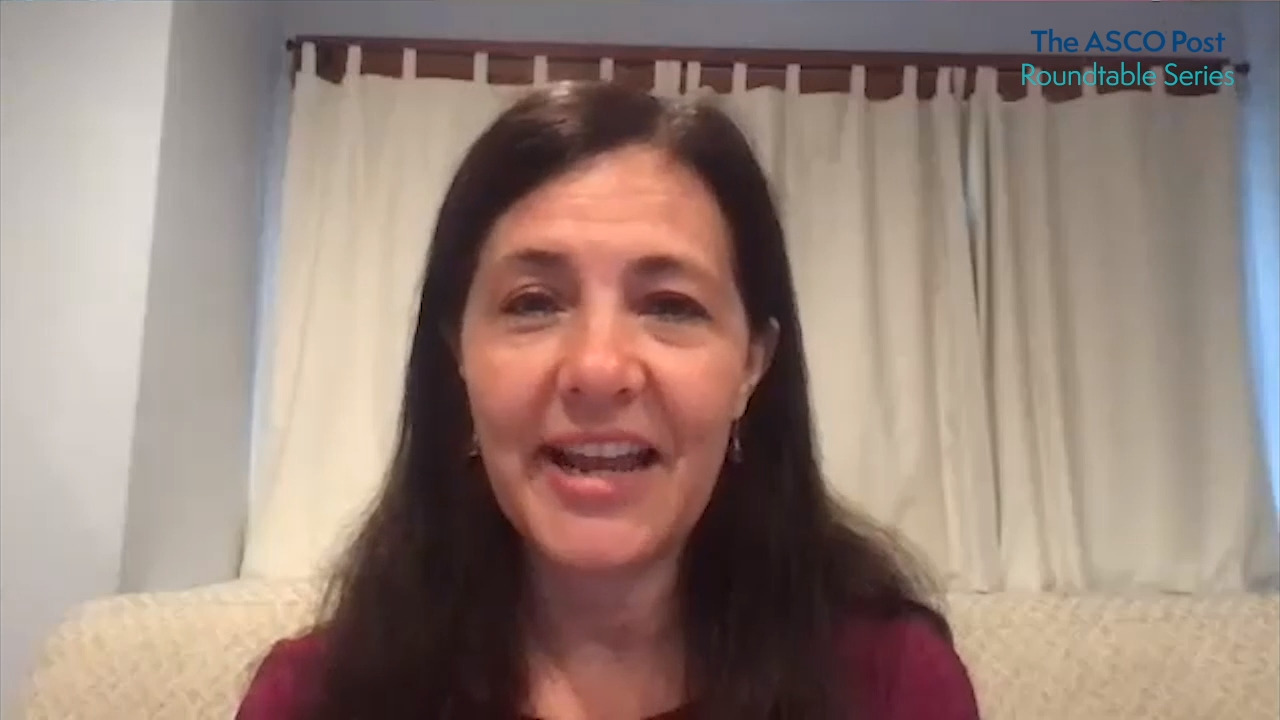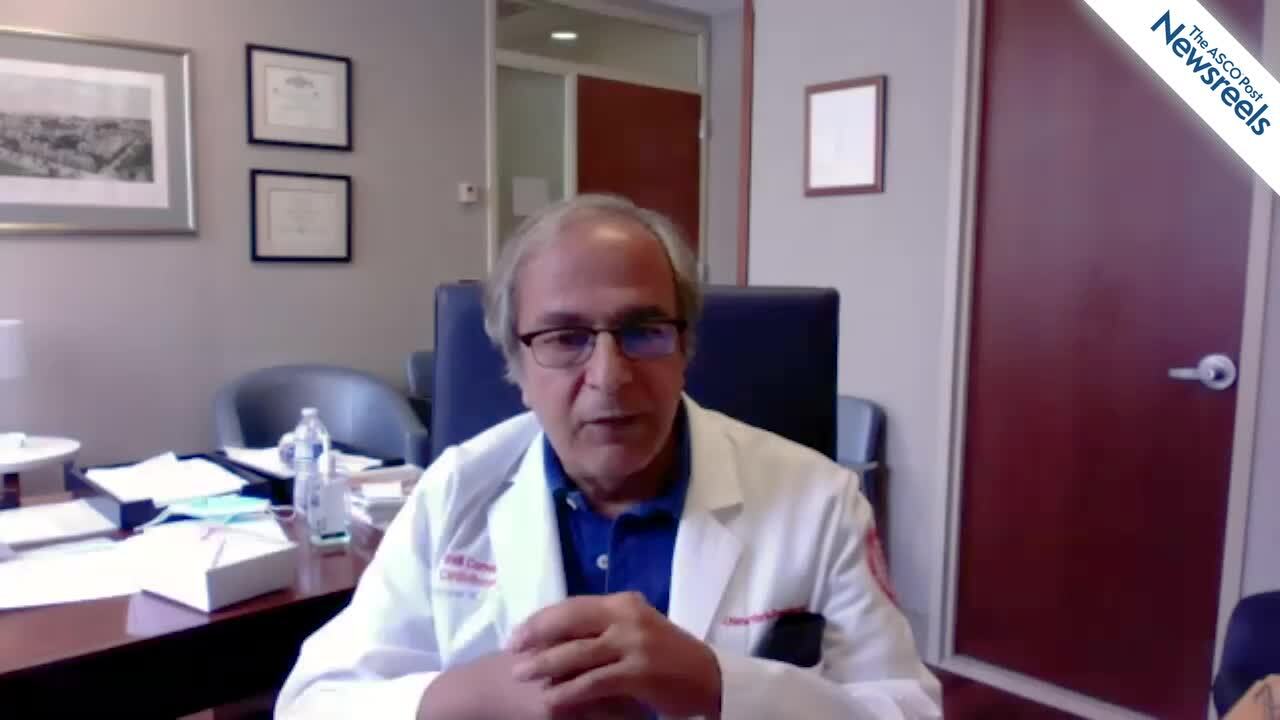I Say ‘Yes’ to Life
I have been a registered nurse for almost 5 decades and was completely unprepared to hear the words “You have stage IV lung cancer.” I think receiving the diagnosis was especially shocking because the symptoms I began experiencing in the summer of 2015, including some unusual weight gain,...
Expert Point of View: Christine M. Lovly, MD, PhD
Invited discussant of the eXalt3 trial, Christine M. Lovly, MD, PhD, Associate Professor of Oncology and Hematology, and Ingram Professor of Cancer Research, and Co-Leader of the Translational Research and Interventional Oncology Program at Vanderbilt University Medical Center and Vanderbilt Ingram ...
Ensartinib Doubles Progression-Free Survival in ALK-Positive NSCLC, Phase III Trial Reports
A potent, a next-generation ALK inhibitor has demonstrated promising efficacy in the first-line treatment of patients with advanced ALK-positive non–small cell lung cancer (NSCLC), according to data presented during the 2020 International Association for the Study of Lung Cancer’s World Conference...
Expert Point of View: Dean A. Fennell, FRCP, PhD
Invited discussant of the CheckMate 743 trial, Dean A. Fennell, FRCP, PhD, Director of the Mesothelioma Research Program and Chair of Thoracic Oncology at The University of Leicester and University Hospitals of Leicester, United Kingdom, noted the combination of nivolumab and ipilimumab has been...
Nivolumab Plus Ipilimumab: New Standard of Care in First-Line Treatment of Unresectable Malignant Pleural Mesothelioma?
Immunotherapy is taking on yet another highly aggressive cancer and yielding strong results, according to data presented during the 2020 International Association for the Study of Lung Cancer’s World Conference on Lung Cancer Virtual Presidential Symposium.1 A prespecified interim analysis of the...
FDA Approves Pralsetinib for Metastatic RET Fusion–Positive NSCLC
On September 4, the U.S. Food and Drug Administration (FDA) approved pralsetinib (Gavreto) for the treatment of adult patients with metastatic RET fusion–positive non–small cell lung cancer (NSCLC), as detected by an FDA-approved test. The approval is based on data from the phase I/II ARROW...
FDA Pipeline: Priority Reviews in Multiple Myeloma, Metastatic Breast Cancer, and NSCLC
Recently, the U.S. Food and Drug Administration (FDA) granted Priority Review to agents for the treatment of refractory multiple myeloma, metastatic breast cancer, and metastatic non–small cell lung cancer (NSCLC); gave Fast Track designation to treatments for NTRK mutation–positive solid tumors...
Research Shows ‘Social Smoking’ Raises Risk of Death From Lung Disease and Lung Cancer
Low-intensity smokers—individuals who smoke fewer than 10 cigarettes per day—are more than twice as likely to die of lung disease and more than eight times as likely to die of lung cancer than nonsmokers, according to research presented by Balte et al at the European Respiratory Society...
Selective MET Inhibitor Tepotinib in Patients With Advanced NSCLC and MET Exon 14–Skipping Mutation
As reported in The New England Journal of Medicine by Paul K. Paik, MD, and colleagues, the phase II VISION trial has shown durable responses with the highly selective MET inhibitor tepotinib in patients with non–small cell lung cancer (NSCLC) and MET exon 14–skipping mutation. As noted by the...
Osimertinib vs Platinum/Pemetrexed and Overall Survival in Patients With EGFR T790M Advanced NSCLC: AURA3 Trial
In patients with epidermal growth factor receptor (EGFR) T790M advanced non–small cell lung cancer (NSCLC), no statistically significant benefit in overall survival was observed with osimertinib vs pemetrexed plus carboplatin/cisplatin (platinum/pemetrexed) treatment, which possibly reflects the...
Is It Time to Add Checkpoint Inhibitors to the Treatment of Locally Advanced Lung Cancer?
After more than 20 years of failed strategies to improve survival rates for locally advanced lung cancers, checkpoint inhibitors have revolutionized therapy, but prognoses still lag behind other tumor types. During the ASCO20 Virtual Education Program, Mark G. Kris, MD, FASCO, a thoracic medical...
ORIENT-11 Trial Shows Sintilimab Plus Chemotherapy Improves Progression-Free Survival in Advanced NSCLC
The first-line setting for patients with locally advanced or metastatic non-squamous non–small cell lung cancer (NSCLC) now has become more complicated, according to data presented during the 2020 International Association for the Study of Lung Cancer’s World Conference on Lung Cancer Virtual...
Marina C. Garassino, MD, on COVID-19 and Thoracic Malignancies: TERAVOLT Registry
Marina C. Garassino, MD, of the Istituto Nazionale dei Tumori di Milano, discusses the global registry she and her colleagues created to track and address the 35% higher mortality risk from COVID-19 among patients with lung cancer who are treated with chemotherapy.
RET Inhibitor Selpercatinib Achieves Durable Responses in Majority of Patients With RET Gene Fusions
For patients with non–small cell lung cancers (NSCLC) marked by RET gene fusions, the targeted therapy selpercatinib was well tolerated and achieved durable objective responses in the majority of participants in the phase I/II LIBRETTO-001 trial, according to researchers from The University of...
Leora Horn, MD, on NSCLC: Ensartinib vs Crizotinib in ALK–Positive Disease
Leora Horn, MD, of Vanderbilt University, discusses phase III results from the eXalt3 trial, which suggest that ensartinib, a novel, next-generation ALK inhibitor, is superior to crizotinib in terms of progression-free survival as well as efficacy in central nervous system metastases for patients with ALK-positive non–small cell lung cancer (Abstract 2).
Misako Nagasaka, MD, on NSCLC: Sintilimab, Pemetrexed, and Platinum as First-Line Therapy
Misako Nagasaka, MD, of the Barbara Ann Karmanos Cancer Institute, discusses results of the ORIENT-11 trial, which showed that, although sintilimab plus pemetrexed and platinum significantly improved progression-free survival, the combination only nominally improved overall survival in patients with locally advanced or metastatic nonsquamous non–small cell lung cancer (Abstract 1).
Two Organizations Collaborate to Evaluate the Utility of Liquid Biopsy in Treating Lung Cancer
The Cancer Research Institute and The Mark Foundation for Cancer Research have launched an innovative clinical trial that aims to demonstrate the utility of liquid biopsy in assessing responses of patients with lung cancer to immunotherapy (ClinicalTrials.gov identifier NCT04093167). If the trial...
Has Racial Disparity in Lung Cancer Incidence Lessened Among Young Adults?
A trend of higher lung cancer incidence rates in young Black people vs young White people in the United States has flipped, with the Black-White gap disappearing in men and reversing in women. The changing trends coincide with steeper declines in smoking among Black Americans, according to a new...
Paul Baas, MD, PhD, on Mesothelioma: First-Line Nivolumab Plus Ipilimumab vs Chemotherapy
Paul Baas, MD, PhD, of the Netherlands Cancer Institute, discusses results of the CheckMate 743 trial, which suggests nivolumab plus ipilimumab should be considered the new standard of care in first-line treatment of unresectable malignant pleural mesothelioma, regardless of the histology subtype (Abstract 3).
FDA Pipeline: Priority Reviews for Immunotherapy Dose Regimen, Small Cell Lung Cancer; Fast Track Designations in Brain Cancer and Leukemia
Recently, the U.S. Food and Drug Administration (FDA) granted Priority Reviews for a novel dosing regimen for durvalumab as well as for trilaciclib in small cell lung cancer; granted Fast Track designations to treatments for glioblastoma and B-cell acute lymphoblastic leukemia; and issued reports...
Current Lung Cancer Screening Guidelines May Underselect Black Ever-Smokers
Public health screening guidelines for lung cancer followed by the U.S. Preventive Services Task Force (USPSTF) and the Centers for Medicare & Medicaid Services (CMS) undercount eligible Black individuals, according to a study by Mary Pasquinelli, DNP, FNP-BC, and colleagues in press at the...
Association of Surgical Volume Pledge With Short-Term Outcomes After Lung Cancer Resection
In a retrospective study reported in the Journal of Clinical Oncology, Farjah et al found that patients who underwent resection for lung cancer at hospitals and with surgeons meeting Volume Pledge criteria did not have better short-term outcomes compared with patients who received care from...
Brigatinib vs Crizotinib in ALK Inhibitor–Naive Patients With ALK-Positive Advanced NSCLC
As reported in the Journal of Clinical Oncology by D. Ross Camidge, MD, PhD, and colleagues, a second prespecified interim analysis of the pivotal phase III ALTA-1L trial has shown maintained progression-free survival benefit with brigatinib vs crizotinib in ALK inhibitor–naive patients with...
FDA Pipeline: Approval for First Liquid Biopsy Next-Generation Sequencing Companion Diagnostic; Designations in Ovarian Cancer, Leukemia, and Lymphoma
Recently, the U.S. Food and Drug Administration (FDA) approved the first liquid biopsy companion diagnostic that also uses next-generation sequencing technology to identify patients with non–small cell lung cancer (NSCLC) and specific types of EGFR mutations. The FDA also granted Fast Track...
Study Suggests Drop in Non–Small Cell Lung Cancer Mortality Rates Due to Treatment Advances, Reduction in Incidence
A study by researchers at the National Cancer Institute investigating mortality trends in lung cancer by subtype has found that population-level mortality from individuals with non–small cell lung cancer (NSCLC) fell sharply from 2013 to 2016, and that survival after diagnosis improved...
Having Cancer Has Not Affected Me in Any Negative Way
I have witnessed much sickness and death over my 35-year career as a medical oncologist. During the early years of my career, I had difficulty dealing with the sickness and death I witnessed on a regular basis. As a result, with help from the Hindu scripture of Bhagavad Gita, I have trained my...
Neoadjuvant Atezolizumab Plus Chemotherapy Produces High Major and Complete Pathologic Response Rates in Resectable NSCLC
In a phase II study reported in The Lancet Oncology, Catherine A. Shu, MD, of Columbia University Irving Medical Center, and colleagues found that neoadjuvant treatment with atezolizumab plus nab-paclitaxel/carboplatin produced a major pathologic response in 57% of patients and pathologic complete...
Incorporating Immunotherapy Into Treatment of Early-Stage NSCLC
There is a strong rationale for incorporating immunotherapy into the treatment of early-stage non–small cell lung cancer (NSCLC), given the breakthrough results with PD-1 checkpoint inhibitors as monotherapy, combined with immunotherapy, or combined with chemotherapy in advanced-stage NSCLC. As...
FDA Pipeline: Designations in Kidney and Lung Cancers, Myelodysplastic Syndromes, and More
Over the past few weeks, the U.S. Food and Drug Administration (FDA) has issued designations and accepted applications for novel agents, as well as approved companion diagnostics. We summarize these regulatory movements below. Breakthrough Therapy Designation for MK-6482 in von Hippel-Lindau...
Ramaswamy Govindan, MD, on Differences Among Male and Female Patients With Lung Cancer
Ramaswamy Govindan, MD, of Washington University School of Medicine, discusses sex differences in lung cancer, including variations in treatment response, and the state of research in the field (Session ED20).
Pyrotinib for Pretreated Patients With HER2-Mutated Advanced NSCLC
In a Chinese phase II trial reported in the Journal of Clinical Oncology, Zhou et al found that pyrotinib produced durable responses in patients with HER2-mutated advanced non–small cell lung cancer (NSCLC) who had received prior platinum-based chemotherapy. Study Details The multicenter study...
Modeling Study Aims to Estimate the Effect of the COVID-19 Pandemic on Cancer Deaths in England
In a population-based modeling study reported in The Lancet Oncology, Maringe et al estimated that delays in diagnosis due to the COVID-19 pandemic could result in 3,291 to 3,621 additional deaths from breast, colorectal, esophageal, and lung cancers within 5 years. As stated by the investigators,...
Anti-TIGIT Antibody Plus Atezolizumab Move Forward in Advanced NSCLC
Tiragolumab, an anti-TIGIT antibody, plus the PD-L1 inhibitor atezolizumab exhibited early clinical activity and was tolerated in patients with advanced solid tumors, including those with metastatic non–small cell lung cancer (NSCLC) that was PD-L1–positive and untreated with prior checkpoint...
Treatment of Mesothelioma
Hear from thoracic oncology experts Drs. Ramaglingam, Brahmer, and Wakelee about the current and emerging treatment landscape for mesothelioma. In this video, they discuss first-line treatment data from the DREAM, PrECOG, and CheckMate 743 trials, as well as second-line gemcitabine plus ramucirumab in the RAMES trial.
Treatment of Small Cell Lung Cancer
In this video, Drs. Ramaglingam, Brahmer, and Wakelee discuss the latest in emerging data on the treatment of small cell lung cancer. They highlight several recent clinical trials, including IMpower133, CASPIAN, ECOG-ACRIN EA5161, and KEYNOTE-604 in the first-line setting, and phase II data on lurbinectedin in the second-line treatment setting.
Treatment of KRAS G12C Mutation
Drs. Ramalingam, Brahmer, and Wakelee review the role of KRAS G12C mutation in lung cancer, which is found is 13% of all non–small cell lung cancer. They highlight two investigational therapies, AMG 510 and MRTX 849, and discuss recently presented data.
Adjuvant EGFR Inhibition
Listen to three experts in the field of thoracic oncology—Drs. Ramalingam, Brahmer, and Wakelee—discuss the latest advances in the treatment of EGFR-mutant, early-stage non–small cell lung cancer, including recent data from the ADAURA and CTONG1104 trials, both presented during the ASCO20 Virtual Scientific Program.
Combination Immunotherapy Approaches
In this video, Drs. Ramalingam, Brahmer, and Wakelee discuss the latest in emerging data on chemo/immunotherapy and immunotherapy-based combination approaches for the treatment of non–small cell lung cancer. They review recent data presented during the ASCO20 Virtual Scientific Program, including CheckMate 227 and CheckMate 9LA, as well as the associated clinical implications.
A Diagnosis of Advanced Lung Cancer Is No Longer a Death Sentence
In hindsight, the symptoms I began experiencing in the winter of 2013, including pains in my chest and shoulders and a persistent cough, should have rung loud alarm bells. However, having undergone a pancreatectomy and splenectomy to cure a history of mucinous cystic neoplasms of the pancreas 5...
Lurbinectedin in Previously Treated Metastatic Small Cell Lung Cancer
On June 15, 2020, the alkylating drug lurbinectedin was granted accelerated approval for treatment of adult patients with metastatic small cell lung cancer (SCLC) with disease progression during or after platinum-based chemotherapy.1,2 Supporting Efficacy Data Accelerated approval was based on...
Small Goals, Big Victories
While working toward the goal of conquering cancer, patients often celebrate smaller victories. These wins can range from spending a holiday weekend with family to taking a vacation without restrictions. Jyoti Malhotra, MD, MPH, is a 2015 Young Investigator Award (YIA) recipient helping patients...
Yale Cancer Center Awarded NIH SPORE Renewal for Lung Cancer Research
Yale Cancer Center researchers were awarded an $11 million grant renewal from the National Institutes of Health to fund the Yale Specialized Program of Research Excellence (SPORE) in Lung Cancer. SPORE harnesses the strengths of academic cancer centers by bringing together experts in oncology,...
ctDNA Clearance Predicts Progression-Free Survival With Osimertinib/Savolitinib in EGFR-Mutant, MET-Amplified NSCLC
Circulating tumor DNA (ctDNA) clearance of EGFR mutation—that is, detectable mutation at baseline that became undetectable or dropped below a predetermined threshold—appears to be predictive of extended progression-free survival for patients with EGFR-mutant, MET-amplified non–small cell lung...
Can Radiomics Predict Survival in Patients With NSCLC Receiving Immunotherapy?
Immunotherapy with immune checkpoint inhibitors has made great strides in the treatment of many cancers, but only between 25% and 50% of patients respond with clinical benefit, and these agents come with adverse events and high price tags. Thus, preselection of patients who are likely to respond to ...
Nivolumab/Ipilimumab Shows Benefit in Patients With Non–Small Cell Lung Cancer and Brain Metastases
The combination of nivolumab plus ipilimumab was at least as effective as chemotherapy in front-line therapy for patients with advanced non–small cell lung cancer (NSCLC) and brain metastases at baseline, according to the results of a post hoc analysis from part 1 of the phase III CheckMate 227...
Nasser K. Altorki, MD, on Lung Cancer: Radiotherapy and Immune Checkpoint Blockade in the Neoadjuvant Setting
Nasser K. Altorki, MD, of Weill Cornell Medical College, discusses study findings that suggest neoadjuvant low-dose focal stereotactic body radiation plus immune checkpoint blockade (ICB) is safe and causes no surgical delays in early-stage lung cancer, and that major pathologic response rates are likely to be comparable to those with chemotherapy/ICB combinations (Session ED37).
Study Links Mental Health Treatment to Possible Improved Cancer Survival
For people with cancer who have a mental health disorder, getting mental health treatment may help them live longer, a new study published by Berchuck et al in JAMA Oncology suggests. In the retrospective study, of more than 50,000 veterans treated for lung cancer within the Veterans Affairs (VA)...
Lung Cancer in Nonsmoking Individuals: Differences in Genetics and Response to Treatment
Lung cancer in nonsmokers is a diverse and distinct disease from lung cancer in smokers and is likely to respond differently to targeted treatments, according to results from a new study published by Chen et al in the journal Cell. Scientists studied a patient population in Taiwan with high rates...
Atezolizumab as First-Line Treatment of Metastatic NSCLC With High PD-L1 Expression and No EGFR or ALK Aberrations
On May 18, 2020, atezolizumab was approved for the first-line treatment of adult patients with metastatic non–small cell lung cancer (NSCLC) whose tumors have high PD-L1 expression and no EGFR or ALK genomic tumor aberrations. High PD-L1 expression is defined as PD-L1 staining of at least 50% of...
Do Not Rush to High-Dose Twice-Daily Radiation for Limited Small Cell Lung Cancer
Bjørn Henning Gronberg, MD, PhD, presented a paper at the ASCO20 Virtual Scientific Program reporting astounding positive results favoring higher-dose, twice-daily radiation therapy in limited-stage small cell lung cancer.1 This was a phase II study (large for phase II but small for phase III)...











